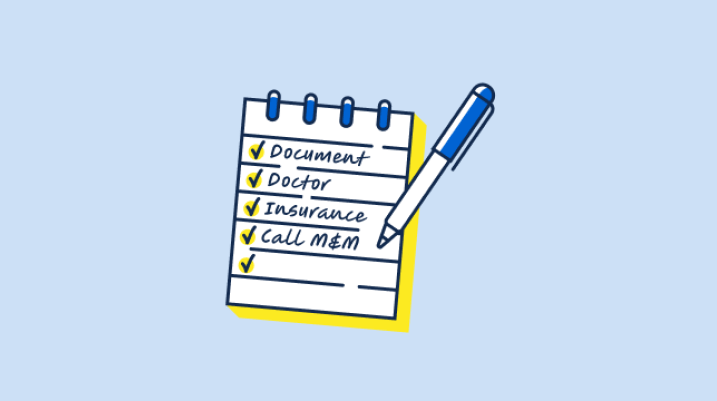Next Steps: The Post Injury Checklist

We know that an injury can turn your life upside down. Between the trauma from the event itself, to starting your road to recovery, you’re probably feeling overwhelmed, stressed, and confused.
You might be asking yourself, what do you do first? Who should you call? How are you going to afford it all?
Here’s a simple checklist that will guide you through the challenges ahead.
I’ve been injured in an auto accident. Now what?
Stay Calm and Get Help
Whether you were involved in a car crash, a slip and fall, a medical injury, or any number of traumatic events, it’s important to get help immediately. Dial 911 to contact the police or emergency medical services right away.
Document Everything at the Scene of the Accident
Take pictures of the scene, which may include your vehicle, unsafe working conditions, faulty products, and more. Write down the date and location where the accident occurred, as well as the names and contact information of any witnesses in case there’s a dispute about your claims later. For car accidents, exchange insurance and contact information with other people involved.
Go to the Doctor and Follow Their Instructions
It could take hours, days, or even weeks for injuries from your accident to start causing you pain. Without a full medical evaluation, it could be tough to prove your injuries resulted from the traumatic event. Follow your doctor’s orders and don’t miss any follow-up appointments or physical therapy sessions (insurance companies could use this against you!).
File a Claim With Your Insurance Company
Although not every personal injury case involves making a claim with an insurance company, many do, so be sure to file your claim soon. Just like missing a doctor’s appointment, the insurance company might use this delay as proof that your injuries are not severe.
Contact a Personal Injury Attorney
If the insurance company delays or denies your claim, or offers you less than you feel you are owed, you should contact an experienced personal injury lawyer to explore your options. An attorney may be able to help you recover significantly more compensation than the insurance company is offering.
In fact, according to the insurance companies’ own studies, people who hire an attorney after an injury-causing accident recover three times more than those who don’t (on average).
Keep Track of All Evidence of Loss
If you were hurt or have damaged property from an accident, you may need to pay for repairs and medical bills you weren’t expecting. But if this accident wasn’t your fault, you shouldn't be responsible for these expenses. Keep track of ALL payments you make so you can be reimbursed later, including receipts. You can receive money to cover the medical bills you already paid, the salary you missed while not working, and the costs of any damaged items from the accident.
Keep a Journal of Pain and Suffering
In really bad accidents, you are entitled to recover money for the pain and tough times you went through, on top of covering things like medical bills and missed work. While there is no set way to measure this sort of damage, keeping a journal of how your daily life and relationships have been affected can help quantify the extent of your pain and suffering, leading to higher compensation.
Don’t delay the process.
Though you can hire a lawyer at any point during the claims process, there is always a legal deadline for how long you have to file a lawsuit. Every state is different, so be sure to check the filing requirements for your state. In most places, a lawsuit must be filed within two or three years of the injury.
If you’re unsure if you’ve been offered what you deserve, always contact a personal injury attorney.
Injured? Getting the compensation you deserve starts here.

Injured?
Not sure what to do next?
We'll guide you through everything you need to know.
